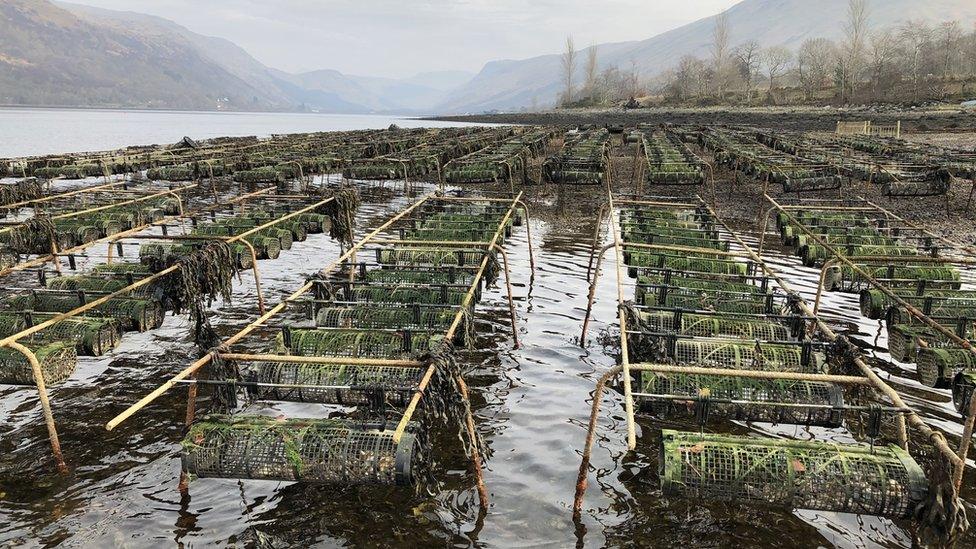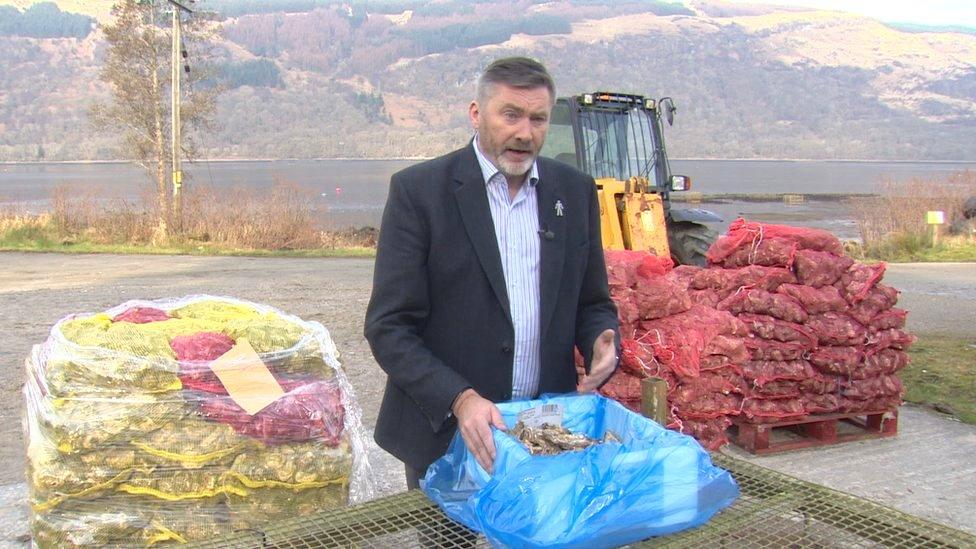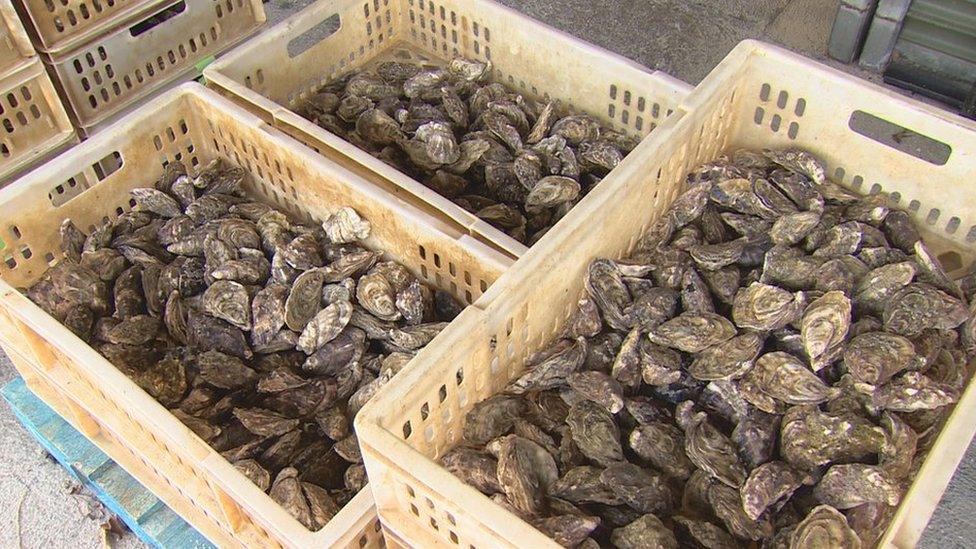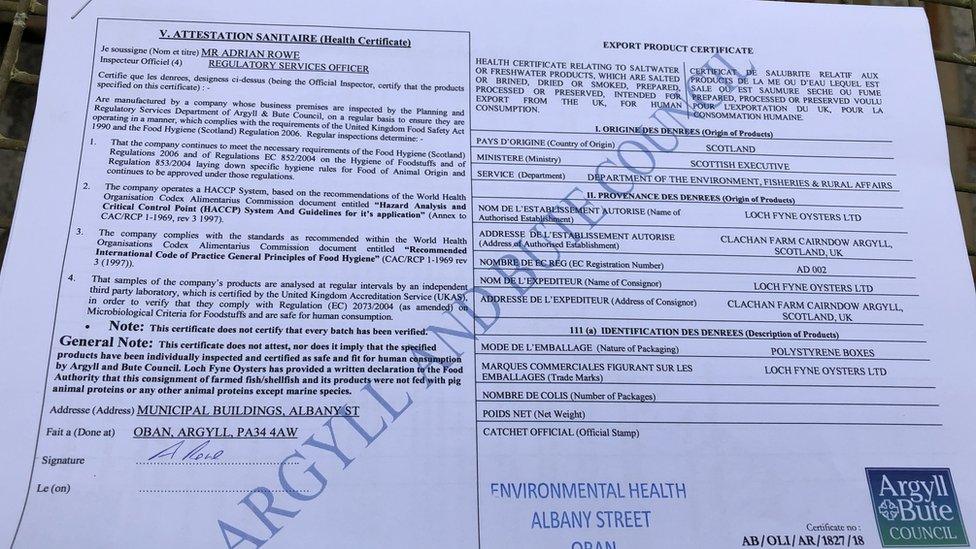Seafood jobs at risk from massive hike in export charges
- Published

Oyster beds on the banks of Loch Fyne
Seafood producers face a huge rise in the cost of exporting as a result of charges imposed by local authorities.
One firm, Loch Fyne Oysters, has seen its bill for council health certificates soar thirtyfold in just two years.
Argyll and Bute Council said it had increased its charges in the face of budget cuts.
But the Clyde Fishermen's Association warned the massive hike in fees could ultimately cost jobs.
Every consignment of food and drink exported to countries outside the EU requires a health certificate.
The charge for a health certificate for a normal consignment has risen from £17 in the last financial year to £91 this year.
As a result Loch Fyne Oysters in Cairndow, near Inveraray, is facing a bill of £125,000 this year.
That's 30 times more than it had to pay just two years ago.

Loch Fyne chief executive Cameron Brown with one of the oyster boxes which require a £91 health certificate
Cameron Brown, managing director of Loch Fyne Oysters, told BBC Scotland: "We have four tonnes of smoked salmon going out this week to Turkey.
"The value of it is £75,000. The health certificate for that costs £91.
"But if we put out a single box of oysters - and we do many of these a year, to various customers around the world - the cost is still £91.
"A box containing 100 oysters, weighing just seven kilos, has a sales value of £65.
"It needs a health certificate costing £91. That makes it unviable for our customers. It's very unfair"
'Massive ongoing burden'
Elaine Whyte, from the Clyde Fisherman's Association, said fees varied so much across Scotland, it was time for action to create a level playing field.
She said: "In the Argyll and Bute region, the cost for these certificates has risen sharply, and it's a massive ongoing burden for any company - particularly those in remote and rural areas - which already faces barriers to getting fresh produce to market.
"These are important employers and there are jobs at stake. So it's untenable.
"There are different levels of charges depending on which local authority you're in."
Ms Whyte said Scotland needed an online system with a flat level price across the country.
She added: "That would be sensible because without that online system you can't get the certificates when you need them. "
The industry body, Scotland Food and Drink, warned that the rising charges could damage a billion pound industry already facing problems because of Brexit.

Oysters are one of Scotland's most popular seafood exports
Chief Executive James Withers said: "The sharp rise in the cost of these certificates is hitting businesses hard.
"The increase in charges, as much as 400% in some areas of the country, have been introduced with little discussion with industry.
"The real concern is they fly in the face of the national efforts to grow food exports from Scotland."
Mr Withers said the impact of the costs would be "massively exacerbated" by Brexit.
He added: "The prospect of businesses having to pay for these certificates for the first time for EU exports is daunting.
"Our industry would have to pay these much higher charges on four times as many certificates as we need now.
"This whole issue needs a rethink."
He said one viable option would be for local authorities to agree a new nationwide charging model, with different costs for different sizes of shipment.

A separate form must be completed for every health certificate
Mr Withers said: "At the moment a 3kg box of seafood costs the same to certify as a lorry load.
"That makes little sense and disproportionately hits smaller firms.
"There is ongoing dialogue and a commitment from councils to discuss solutions.
"But time is ticking on and, as every day passes, the bills are racking up."
The council said it had increased charges to pay for the food safety regime at a time when it was facing year-on-year cuts to its budget.
Last summer it angered hillwalkers after proposing increasing hourly car park charges at Arrochar from 30p to £1.
'Reviewing charges'
Argyll and Bute council declined an interview request from the BBC about the health certificates and would only provide a statement.
A spokeswoman said: "Our enforcement policy is to support business and in doing so, to protect public health and safety.
"We'd like to have maintained fees at their previous low levels but this is, unfortunately, not an option.
"Our export certificate fee was the lowest in Scotland and did not recover the cost of delivering this service."
The council claimed it must make changes to how it meets its statutory duties in the face of year-on-year cuts to its services.
The statement continued: "This is a flat rate certificate and has no add-ons for weekends, late requests, Chinese certificates etc.
"We have listened to businesses and introduced a small quantities charge - an £18 certificate for quantities less than 5kg.
"We continue to work with local exporters on improving our system, reviewing charges so we can offer a Scotland-wide charge."
The council is also working with other local authorities to propose a national framework.